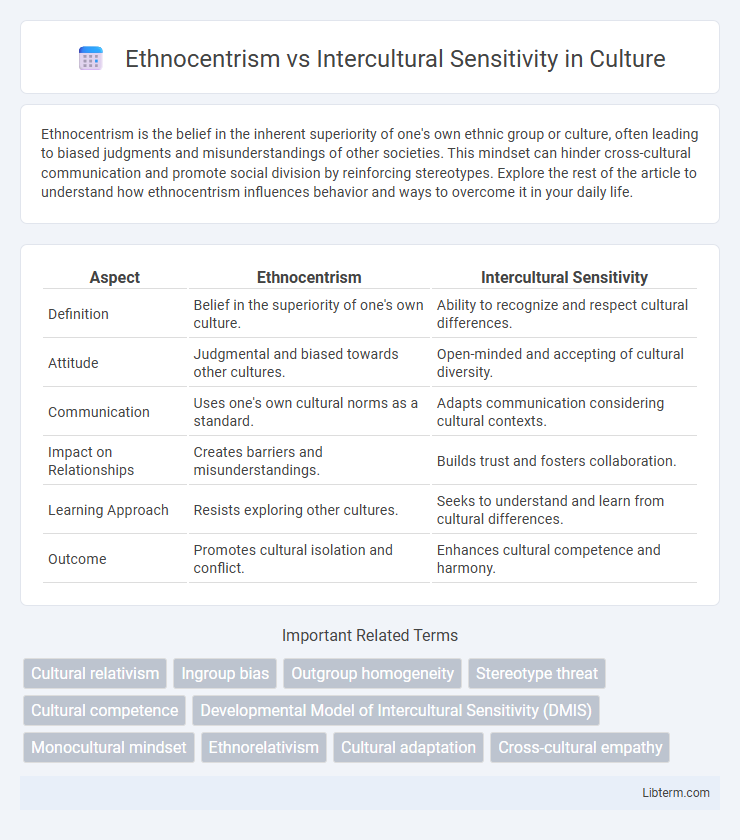Ethnocentrism is the belief in the inherent superiority of one's own ethnic group or culture, often leading to biased judgments and misunderstandings of other societies. This mindset can hinder cross-cultural communication and promote social division by reinforcing stereotypes. Explore the rest of the article to understand how ethnocentrism influences behavior and ways to overcome it in your daily life.
Table of Comparison
| Aspect | Ethnocentrism | Intercultural Sensitivity |
|---|---|---|
| Definition | Belief in the superiority of one's own culture. | Ability to recognize and respect cultural differences. |
| Attitude | Judgmental and biased towards other cultures. | Open-minded and accepting of cultural diversity. |
| Communication | Uses one's own cultural norms as a standard. | Adapts communication considering cultural contexts. |
| Impact on Relationships | Creates barriers and misunderstandings. | Builds trust and fosters collaboration. |
| Learning Approach | Resists exploring other cultures. | Seeks to understand and learn from cultural differences. |
| Outcome | Promotes cultural isolation and conflict. | Enhances cultural competence and harmony. |
Understanding Ethnocentrism: Definition and Origins
Ethnocentrism is the belief in the inherent superiority of one's own ethnic group or culture, often leading to biased judgments and social exclusion of others. Rooted in evolutionary psychology and social identity theory, it stems from humans' natural tendency to favor in-group members for survival and social cohesion. This mindset restricts cross-cultural understanding and hinders the development of intercultural sensitivity, which requires recognizing and valuing cultural diversity.
Defining Intercultural Sensitivity: Key Concepts
Intercultural sensitivity involves the recognition and appreciation of cultural differences, fostering effective communication and reducing ethnocentric attitudes. Key concepts include cultural empathy, open-mindedness, and adaptability, which enable individuals to navigate diverse social contexts respectfully. Developing intercultural sensitivity enhances social cohesion and promotes global cooperation by valuing varied cultural perspectives.
The Spectrum: From Ethnocentrism to Intercultural Sensitivity
The spectrum from ethnocentrism to intercultural sensitivity illustrates a progressive shift in cultural awareness, beginning with denial and defense stages where one's own culture is seen as superior. As individuals advance, they enter stages of minimization and acceptance, recognizing cultural differences and appreciating diverse perspectives. The highest levels of intercultural sensitivity involve adaptation and integration, where individuals skillfully navigate and harmonize multiple cultural worldviews in diverse social contexts.
Impact of Ethnocentrism on Communication
Ethnocentrism significantly hampers effective communication by fostering biased perceptions and misunderstanding between cultural groups, leading to stereotyping and misinterpretation of messages. This cultural bias often results in reduced empathy, increased conflict, and the breakdown of collaborative efforts in multicultural environments. Promoting intercultural sensitivity mitigates these issues by encouraging open-mindedness, active listening, and respect for diverse cultural perspectives, enhancing mutual understanding and cooperation.
Benefits of Cultivating Intercultural Sensitivity
Cultivating intercultural sensitivity enhances communication effectiveness by fostering empathy and reducing misunderstandings in diverse environments. It promotes inclusivity and collaboration, leading to improved teamwork and innovation within multicultural settings. Developing this skill nurtures global competence, allowing individuals and organizations to navigate cultural differences with respect and adaptability.
Stages of Intercultural Development
Ethnocentrism is characterized by viewing one's own culture as the standard, leading to cultural bias and misunderstanding. Intercultural sensitivity, as outlined in the Developmental Model of Intercultural Sensitivity (DMIS), progresses through six stages: Denial, Defense, Minimization (ethnocentric stages), followed by Acceptance, Adaptation, and Integration (ethnorelative stages). Advancing through these stages fosters greater cultural awareness, empathy, and effective communication across diverse cultural contexts.
Barriers to Developing Intercultural Sensitivity
Ethnocentrism creates barriers to developing intercultural sensitivity by fostering biased perceptions and reducing openness to diverse cultural perspectives. This cognitive bias limits effective communication and collaboration across cultures, reinforcing stereotypes and misunderstandings. Overcoming these barriers requires conscious effort to challenge ingrained cultural assumptions and actively engage with different value systems.
Strategies to Overcome Ethnocentrism
Overcoming ethnocentrism requires cultivating intercultural sensitivity through strategies such as cultural immersion, active listening, and empathy development to appreciate diverse perspectives. Training programs emphasizing cultural awareness and bias recognition help individuals identify and challenge their own assumptions. Encouraging open dialogue and fostering inclusive environments promote mutual respect and reduce ethnocentric attitudes in multicultural settings.
Real-Life Examples: Ethnocentrism vs Intercultural Sensitivity
Ethnocentrism manifests in real life through biased workplace decisions, such as managers favoring employees from their own culture, which impedes diversity and innovation. In contrast, intercultural sensitivity is demonstrated by multinational teams that actively seek to understand and respect different cultural perspectives, leading to improved collaboration and problem-solving. For example, a global company implementing cultural awareness training often experiences higher employee satisfaction and greater market success across regions.
Fostering Global Citizenship through Intercultural Awareness
Ethnocentrism limits global citizenship by promoting cultural superiority and hindering open-minded engagement with diverse perspectives. Intercultural sensitivity enhances global citizenship by fostering empathy, effective communication, and respect for cultural differences. Developing intercultural awareness equips individuals to collaborate across cultures, supporting inclusive and sustainable global communities.
Ethnocentrism Infographic

 libterm.com
libterm.com